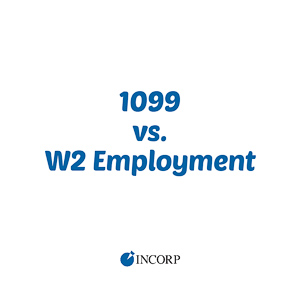Stay in the know!
Join our newsletter for special offers.
For tax purposes, one of the first things you should consider when hiring help is whether your workers will be classified as 1099 or W2. Employers often become perplexed over the considerable differences as there are many tax and legal implications associated with each classification, and we're here to help alleviate the stresses affiliated with the uncertainty of each tax form.
Let's start with the basics of each form. Unless you've been self-employed your entire life, everyone who has ever worked has most likely received a W2. A W2 form is a tax document employers prepare for their employees that provide an outline of wages earned and taxes withheld throughout a given fiscal year. A 1099 form, however, is a simple document that a company will prepare for its vendors/contractors/freelancers that include ONLY income received. In essence, it's an accounting of all monies paid by a company to an individual.
Although it's all a matter of perspective, there are various advantages to hiring W2 employees. Firstly, you will have the ability to dictate which days and hours your employees will work, what they can and cannot wear to the office, etc… hiring W2 employees provides you with a bit more control over the day-to-day operations performed by your workers versus hiring a 1099 contractor.
A distinct disadvantage to hiring a W2 worker is the fact that employers are also required to pay various payroll and employment taxes. According to IRS.gov, "employers must report income and employment taxes withheld from their employees on an Employer's Quarterly Federal Tax Return (Form 941) and deposit these taxes in full to an authorized bank or financial institution pursuant to Federal Tax Deposit Requirements. Employers are also responsible for filing a FUTA return annually, and depositing those taxes."
Note: Companies that do not adhere to employment tax laws may be subject to legal action for willfully failing to pay employment taxes.
It's also important to consider the fact that, in addition to salary, most employers are expected to offer benefits packages to their full-time employees. Benefits packages typically include health insurance, vacation time, sick time, retirement savings accounts, and some employers even offer stock options as a competitive advantage.
As mentioned above, a 1099 form lists only income paid by a company to an individual. Employers are therefore relieved from paying employment and payroll taxes by hiring a 1099 contractor; however, they do not have as much control over the management of their hired help.
The U.S. Department of Labor created a six-question guideline for companies to adhere to when determining the classification of their workers:
This guideline is used in determining the importance of the role a worker plays in the company. For instance, a dental assistant will play an integral part in a dental office, whereas a bookkeeper hired to prepare year-end filings will not. The dental assistant will most likely be hired as a W2 employee while the bookkeeper can be classified as a 1099 worker.
A computer programmer can experience profit and loss if a contract is not renewed, if it is renewed at a different amount, or if new work is to be taken on. However, the same worker could be classified as an employee if they are not in charge of scheduling projects and negotiating contracts for additional work.
If an employer invests more money into a position than a worker (e.g., providing cleaning supplies for a maid, providing a vehicle for a driver, providing a workstation and computer for a web designer), the courts could rule in favor of an employer/employee working relationship, and vise-versa if the workers are responsible for obtaining their own equipment/supplies.
According to the department of labor, this isn't a matter of technical skills, rather, specialized business skills. If a worker is making independent judgments without having to be told what to do, they could be classified as a 1099 worker.
Per the department of labor, if the relationship is permanent, they will most likely be classified as a W2 employee.
Companies that comply with the idea of “stringent control” over their workers (dictating hours worked, days worked, and dress code) should most likely be entering their workers into a W2 employment contract.
There are various legal implications associated with misclassifying a worker, so it's important to consult with your attorney before entering into a vendor or employment contract. However, the IRS has issued the following statement as a general rule of thumb: “If you have the right to control or direct not only what is to be done, but also how it is to be done, then your workers are most likely employees.”
Join our newsletter for special offers.
